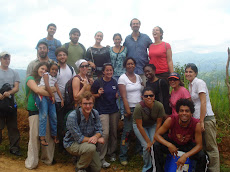Discuss what we have done, the work OR does, the space we lived in, the most impactful and least impactful events, and the food.
Nick:
-Community visits/ free trade = most impactful
- Seeing first hand abstract studies make sense of how people who work in free-trade zones really live.
Lauren:
- Got more from learning the story of the community than by touring it. Important to know history and what OR is doing
Logan:
- Know vision and mission of OR early on in the experience
Jennifer:
- Liked going to different schools on different days because we were able to discuss the experience of one before that of the other
- Hands on experience is better than discussions
- Haitian groups actually showed their tactics implemented
Billie Dawn:
- Discussion between the relationships between OR and the free trade zone or the museum.
- Museum supports events at times. Free trade fair where sell things to fund raise for programs – they sometimes donate.
- Relationships built little by little. With sona franco if we work in the rover community (most extremely poor community).
Anthony:
- the food was god because between it and what we had in Santo Domingo we had a god cultural combination of foods.
Merideth:
- Sefasa was very nice and I wish we had more information
- Also want to learn about other groups in the community with or without connections to OR
Sefasa was founded by Jesuits who founded a perish. They work with rural farm workers also have services for refugees and they work with human rights.
Alejandro:
- I liked central eon because it was interesting for the history f the DR. We saw the history there from a different perspective than we had seen before. We had an impactful discussion after we saw with our own eyes some of the conditions in Gurabo.
- We could compare that to what we learned in class and what was left out of the textbooks.
- We were also able to understand our reactions to the omittance of history.
Nicole:
- Lesson= crucial part of the organization is to make relationships to those you work with. Before I came I thought I had to inspire people to think the same things I do, and fix problems I saw. Now I see what they want, and help with resources to do what they need.
Camilla:
- Nice discussion/application balance
- Liked artisan workshop
Francesca:
- Free time was very nice.
- I loved getting the feel for the organization even in our down time.
Jennifer:
- Wanted to hear more about the organizing the organization does. How they got things together? People's roles in the community?
The group started with religion, then they visited community members, motivated them, and drank coffee with them. Then they began a literacy campaign with women and children. This was an organizing tool they used to answer the demands of the community, and to build trust. In organizing work people listen, but they don't always respond the way we want to hear. Patience and waiting is essential.
Alicia:
- Changes? In this community r in this type or organizing in general?
- - When started all the work was Chrisitan based. Schools and health were in response to spiritual reflection.
- More community organizations with eccumennial focus.
- Acupuncture different
- Visits before they were shorter. The second year there was more time for kids and getting to know eachother. This year: there were new things worth highlighting. Sefasa living conditions. Most similar to what we were seeing because it wasn't a very separate retreat like other places we stayed. This year we were also able to see different people in different areas of OR, do their job. This group grew a lot here. Reflected about deep issues.
Wednesday, June 25, 2008
Subscribe to:
Post Comments (Atom)

No comments:
Post a Comment